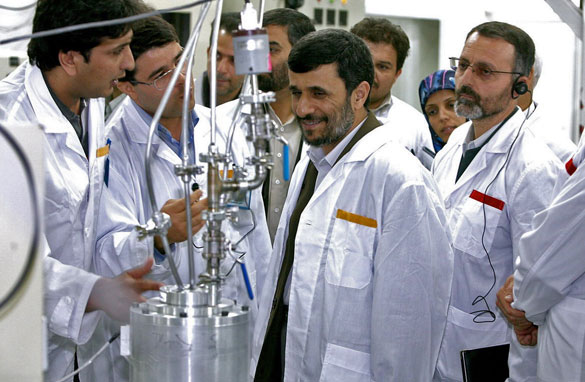Dana Beltaji
Delegates have praised IranÔÇÖs positive attitude and constructive dialogue following the first session of negotiations on IranÔÇÖs nuclear programme.
Iran appeared to have shown ÔÇÿserious engagementÔÇÖ in the talks, with a second round of dialogue likely to be scheduled for next month. Representatives of the United States, Britain, Russia, China, Germany and France met with Iranian officials for the first time in 15 months in attempt to halt growing tensions in the region; particularly between Iran and Israel, the latter threatening military action against Iran earlier this spring.
According to diplomats present at the talks, EU foreign policy chief Catherine Ashton opened the talks by recalling the history of the inconsistent negotiations between Iran and the inter- national community on the atomic programme. This was met by a response from Saeed Jalili, the chief Iranian negotiator whose response was describes as ÔÇÿnot long or bom- bastic or propagandistic. The tone was calm and constructive. He said he was ready to seriously engage on the Iranian nuclear issue.ÔÇÖ Jalili did disagree with some points made but diplomats present state that they were made in a calm, non confrontational manner. His suggestion to set up future negotiations further seem promising.
Yet these positive talks┬ácould possibly take a negative turn in the following schedule set of ne- gotiations which will require both sides to be more specific rather than the generalised discussions that had taken place. This is not to say that these discussions are not a significant improvement; previ- ous talks had collapsed when Jalili refused to negotiate until economic sanctions had been lifted. Talks had quickly failed as the six world pow- ers had refused to do so. Since these futile attempts at discussion in Jan- uary 2011, the EU had announced an oil embargo against Iranian im- ports. These measures have heavily impacted IranÔÇÖs economy, which has┬áultimately led to their willingness to negotiate further.
The most worrying for the international community and the reason why these talks have been initiated and reinstated time and┬átime again is IranÔÇÖs production of 20% enriched uranium. This moved the nation much closer to the possibility of producing nuclear weapons. Despite IranÔÇÖs claims that production of enriched uranium was for more peaceful purposes, Western suspicion was heightened when Iran began nuclear research an production at the Fordow military site near Qom, Iran. Western diplomats are predicting that Iran would be┬áwilling to limit their production of enriched uranium in return for the economic sanctions to be lifted. Iran remained adamant that it is not their intention to create nuclear weapons, and their right to create and use nuclear energy peacefully is protected by the nuclear non-proliferation treaty. Further reassurances to the international com- munity were made by IranÔÇÖs head of the nuclear initiative, Fereydoun Abassi-Davani who suggested that uranium enrichment could be sus- pended once Iran had enough mate- rial. They currently have enough to maintain TehranÔÇÖs research for a further 8 years.
Yet what further problematises the negotiation efforts is WashingtonÔÇÖs strict stance on IranÔÇÖs nuclear programme who intend on halting production of enriched uranium in Iran entirely as well as a closure of their nuclear research facilities. This goes against the policy of the six nations group who are more concerned with reaching agreement with Iran through discussion rather than forcing entire closure of nuclear research within the country. US secretary of state, Hilary Clinton, reasserts these intentions by asking Iran to deliver ÔÇÿconcrete resultsÔÇÖ. She wants Iran ÔÇÿto demonstrate, clearly, in the actions they propose that they have truly abandoned any nuclear weapons ambition.ÔÇÖ She continued, ÔÇÿOf course, in a negotiation, we understand that the Iranians will be asking for assurances or actions from us and we will certainly take those under consideration.ÔÇÖ
It is unlikely that negotiations will continue in such a positive fashion throughout continued talks, but the positivity that surrounds these initial discussions provide promise. Iran has not yet ruled out any possibilities; a striking start for a previously difficult and inconstant negotiations process. The next step is to make the talks more concrete; offering real solutions and settlements will be vital to the success of both the six nations group and Iran in achieving a desirable outcome.





Add Comment